 We look to the Eastern Fathers for a deeper understanding of God in Trinity. St. Gregory Nazianzen, one of the Cappadocian Fathers and who is sometimes called the minstrel of the Holy Trinity, tells us in one of his theological poems:
We look to the Eastern Fathers for a deeper understanding of God in Trinity. St. Gregory Nazianzen, one of the Cappadocian Fathers and who is sometimes called the minstrel of the Holy Trinity, tells us in one of his theological poems:
From the day whereon I renounced the things of the world to consecrate my soul to luminous and heavenly contemplation, when the supreme intelligence carried me hence to set me down far from all that pertains to the flesh, to hide me in the secret places of the heavenly tabernacle; from that day my eyes have been blinded by the light of the Trinity, whose brightness surpasses all that the mind can conceive; for from a throne high exalted the Trinity pours upon all, the ineffable radiance common to the Three. This is the source of all that is here below, separated by time from the things on high. From that day forth I was dead to the world and the world was dead to me. At the close of his life he longs to be ‘there where my Trinity is, and the gathered brightness of Its splendor. Trinity, whose dim shadows exalt me.
It is obvious from such words that St. Gregory had a true experience of God in Trinity. To him, the Three Persons of the Trinity were reality. The Trinity was not just an abstract idea that humans developed in order to understand God. Rather, the Trinity was real to Gregory.
If the very foundation of created being is change, the transition from non-being to being, if the creature is contingent by nature, the Trinity is an absolute stability. One would say, an absolute necessity of perfect being; and yet the idea of necessity is not proper to the Trinity, for It transcends the antinomy of what is necessary, and the contingent; entirely personal and entirely nature; liberty and necessity are one, or, rather, can have no place in God. There is no dependence in relation to created being on the part of the Trinity; no determination of what is called “the eternal procession of the divine persons’ by the act of the creation of the world. Even though the created order did not exist, God would still be Trinity – Father, Son and Holy Spirit – for creation is an act of will: the procession of the persons in an act ‘according to nature’.
What Gregory is saying is that God always was Triune in nature and that is His essence. The Trinity is not a mental construct that humanity has created in order to understand the relationship between God and creation. Rather, creation has shown mankind that God is Triune – that He is truly connected to His creation.
